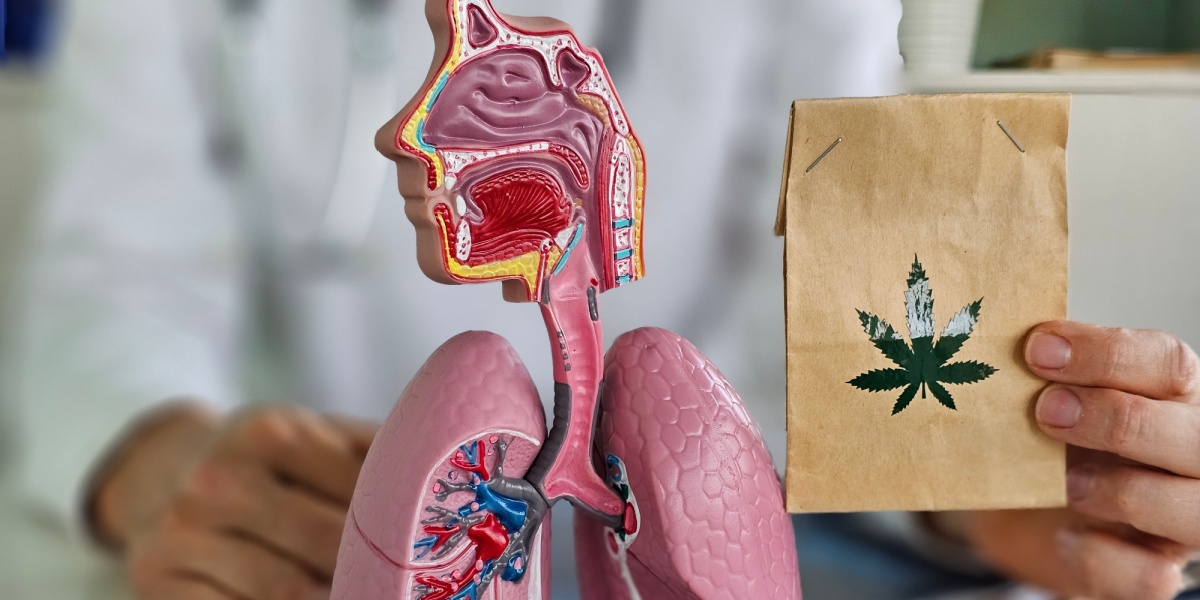Tetrahydrocannabinolic acid (THCa) is a non-psychoactive cannabinoid that can be found in raw cannabis flowers. This means, that unlike THC, when THCa is consumed, it doesn’t give users the typical "high" associated with cannabis. Research has found that if THCa undergoes decarboxylation—a process that converts it into THC—it can then induce mind-altering psychoactive properties.
Due to its lack of psychoactive effects and low potential for addiction, THCa is being explored for its potential health benefits, particularly for individuals who can't tolerate other forms of THC for medicinal purposes and children.
As THCa's popularity grows, understanding its side effects and safety profile has become increasingly crucial. In this article, we’ll discuss the potential risks, factors influencing side effects, and how to consume THCa safely.
- THCa is a non-psychoactive cannabinoid, but when heated, it undergoes decarboxylation which converts it to THC, which can cause psychoactive effects.
- While THCa shows potential health benefits, it may cause side effects such as gastrointestinal discomfort, dizziness, and drug interactions.
- Proper dosing, product quality, and medical guidance can help minimize adverse effects.

Understanding THCa
Cannabis contains over 100 cannabinoids, one of which is THCa. Researchers have identified THCa as the acidic precursor to THC, which is primarily found in raw and unheated cannabis flowers. When heated THCa will convert into THC or delta-9 THC, which exerts psychoactive effects. [1]
Unlike THC, THCa does not directly bind to cannabinoid receptors (CB1 and CB2) in the brain, which is why it doesn't produce the intoxicating effects commonly associated with cannabis. [2] For this reason, THCa is gaining attention for its potential therapeutic benefits, particularly for patients who either do not desire or cannot tolerate the psychoactive effects. This includes children, the elderly, or individuals sensitive to THC. Its lack of psychoactive effects also gives it an exceedingly low potential for developing substance addiction-related disorders. [2]
THCa comes in different forms. It is mainly sold as the actual flower of the plant, patches, diamond crystals, and edibles (gummies or eating the bud raw). [3]
Potential health benefits of THCa
Emerging research suggests that THCa may pose a range of potential health benefits. Because it does not activate CB1 and CB2 receptors in the same way as THC, yet still modulates the endocannabinoid system through alternative pathways, it may still influence physiological functions, like pain perception, immune response, and cellular health without inducing intoxication. [4]
- Anti-inflammatory & pain relief: THCa may help with conditions like arthritis and inflammatory bowel disease. A 2020 study highlighted its anti-inflammatory effects, making it a potential treatment for chronic pain. [5]
- Neuroprotection: A 2023 animal study found THCa may reduce Alzheimer’s-related brain plaques and memory loss. [6] Research also suggests antioxidant and neuroprotective effects for Parkinson’s, potentially improving motor function, sleep, anxiety, and pain. [7] Additionally, THCa shows promise for epilepsy by reducing seizure frequency. [8] However, findings from animal studies require further validation in humans.
- Cancer support: THCa has been explored for its anti-nausea effects in chemotherapy patients. [9] It also exhibits anti-cancer properties, including inhibiting tumor growth, inducing cancer cell death (apoptosis), and protecting healthy cells from inflammation-related damage. [10][11]
- Metabolic health & weight management: Research indicates THCa may aid in weight loss and metabolic health by activating PPARγ, a key regulator of fat storage and metabolism. This suggests potential benefits in preventing obesity and diabetes. [12]
Potential side effects of THCa
Although THCa shows promise in treating a variety of medical conditions, it doesn’t come without the risk of side effects. Individuals may experience side effects, which can vary based on dosage, consumption method, and personal tolerance.
Common side effects
- Digestive issues: Common digestive complaints include nausea, stomach pain, and diarrhea. This is due to how THCA interacts with cannabinoid receptors in the digestive tract, leading to changes in bowel movements (e.g., diarrhea or constipation) or abdominal pain. These effects are usually mild, but they may be more severe in individuals with sensitive stomachs or preexisting digestive issues.
- Dizziness and lightheadedness: Because of THCA’s potential influence on blood pressure regulation, it can lead to dizziness or lightheadedness. While on THCA, some people may have a temporary drop in blood pressure, especially after standing up too quickly. These side effects are more common at higher dosages or when THCA is mixed with other substances. Those prone to low blood pressure should use THCA with caution.
- Possible impact on motor coordination: While THCA is non-psychoactive, studies suggest it may still have subtle effects on motor functioning in high doses. [4]
- Dry mouth: Similar to THC, some individuals may experience dry mouth after consuming THCA-containing products.
Rare side effects
- Allergic reactions: It is possible to experience an allergic reaction from THCA. Symptoms may include skin rashes, itching, or swelling. In more severe cases, an allergic reaction could cause difficulty breathing or shortness of breath, requiring immediate medical attention. If you have a history of cannabis allergies, it’s best to consult a doctor before using THCA.
Potential long-term concerns
- Unknown metabolic effects: Due to limited research, the long-term effects of THCa consumption are not well understood. While preliminary studies suggest metabolic benefits, more research is needed to determine whether prolonged use has unintended consequences, such as altered glucose regulation or fat metabolism.
- Drug interactions: THCa may interfere with certain medications, such as blood thinners or immunosuppressants. [13]
- Liver enzyme alterations: A study suggested that cannabinoids, including THCa, may impact liver enzyme activity, affecting drug metabolism. [14]
- Potential effects on epilepsy treatment: While some cannabinoids are being explored for epilepsy treatment, THCa’s role in treating seizures remains unclear. Some studies suggest it could have anticonvulsant properties, while others highlight potential interactions with conventional anti-seizure medications. [15]
- Immune modulation concerns: Some researchers caution that THCa’s immune-suppressing effects could be problematic for individuals with weakened immune systems, making them more susceptible to infections. [3]
Factors that affect THCa side effects
Several factors can influence how THCa affects an individual:
- Dosage: Higher dosages are more likely to cause side effects.
- Consumption method: Raw cannabis, tinctures, and capsules may have different absorption rates.
- Existing health conditions: Individuals with liver diseases may be at increased risk of developing side effects.
- Individual metabolism: Some people process cannabinoids differently, leading to varying effects.
- Other medications: Certain prescription drugs may enhance or reduce THCa’s effects.
Always speak with a medical professional before incorporating THCa into your healthcare plan. It is crucial they review your health history to determine if you are at a higher risk of side effects.
Decarboxylation: From THCa to THC
THCa remains non-psychoactive unless it undergoes decarboxylation, a chemical reaction triggered by heat or prolonged exposure to air and light. This process removes a carboxyl group, converting THCa into THC, the compound responsible for cannabis' intoxicating effects.
- Heat activation: Decarboxylation occurs when cannabis is exposed to temperatures above 212°F (100°C), with optimal conversion happening around 230-250°F (110-121°C) over 30-45 minutes. [16]
- Storage and time: Over time, THCa slowly converts to THC, even at room temperature, though at a much slower rate.
- Consumption method: Smoking, vaping, or baking cannabis products quickly decarboxylates THCa, producing psychoactive effects, whereas consuming raw cannabis (e.g., in smoothies or juices) preserves THCa in its original form. [17]
Understanding decarboxylation is important for individuals looking to either avoid THC’s psychoactive effects or maximize its presence in cannabis products.
Safety measures and consumption guidelines: Minimizing side effects
To ensure a safe THCA experience, consider the following guidelines:
Choose high-quality products
- Look for lab-tested THCA products to ensure purity and absence of contaminants. According to research, products sold as THCA-only are commonly contaminated with THC in the psychoactive form. [4] This can increase the risk of experiencing unintended side effects. Only purchase THCA from reputable and trusted sources.
- Avoid products with solvents, pesticides, or heavy metals. These contaminants can increase the risk of side effects.
Start with a low dose
- Begin with small amounts and monitor the body’s response. The effects of THCA may differ between individuals.
- Gradually increase the dose if no side effects occur.
Consider consumption methods
- Raw cannabis: Raw products provide THCa without the risk of decarboxylation.
- Tinctures and capsules: These forms offer controlled dosing and easier absorption, but they can decarboxylate if exposed to high temperatures.
- Topicals: Topical forms may provide localized benefits with minimal systemic absorption.
Consult a healthcare professional
- If you have underlying health conditions or take prescription medications, consult a doctor before using THCa.
What to do if you experience side effects
If you experience adverse effects from THCa, consider the following steps:
- Reduce the dosage: Lower THC intake and monitor for symptom improvement.
- Hydrate and rest: Drink plenty of fluids and allow the body to adjust and respond.
- Monitor symptoms: If side effects persist or worsen, discontinue use and seek medical advice.
- Seek emergency care if necessary: In the event of severe allergic reactions, extreme dizziness, or other concerning symptoms, consult a healthcare professional immediately.

-person-thumbnail.jpg?v=1758880627)
-guide-detail.jpg?v=1741692490)
_-Origins,-Effects,-and-Risks-guide-detail.jpg?v=1741683510)
